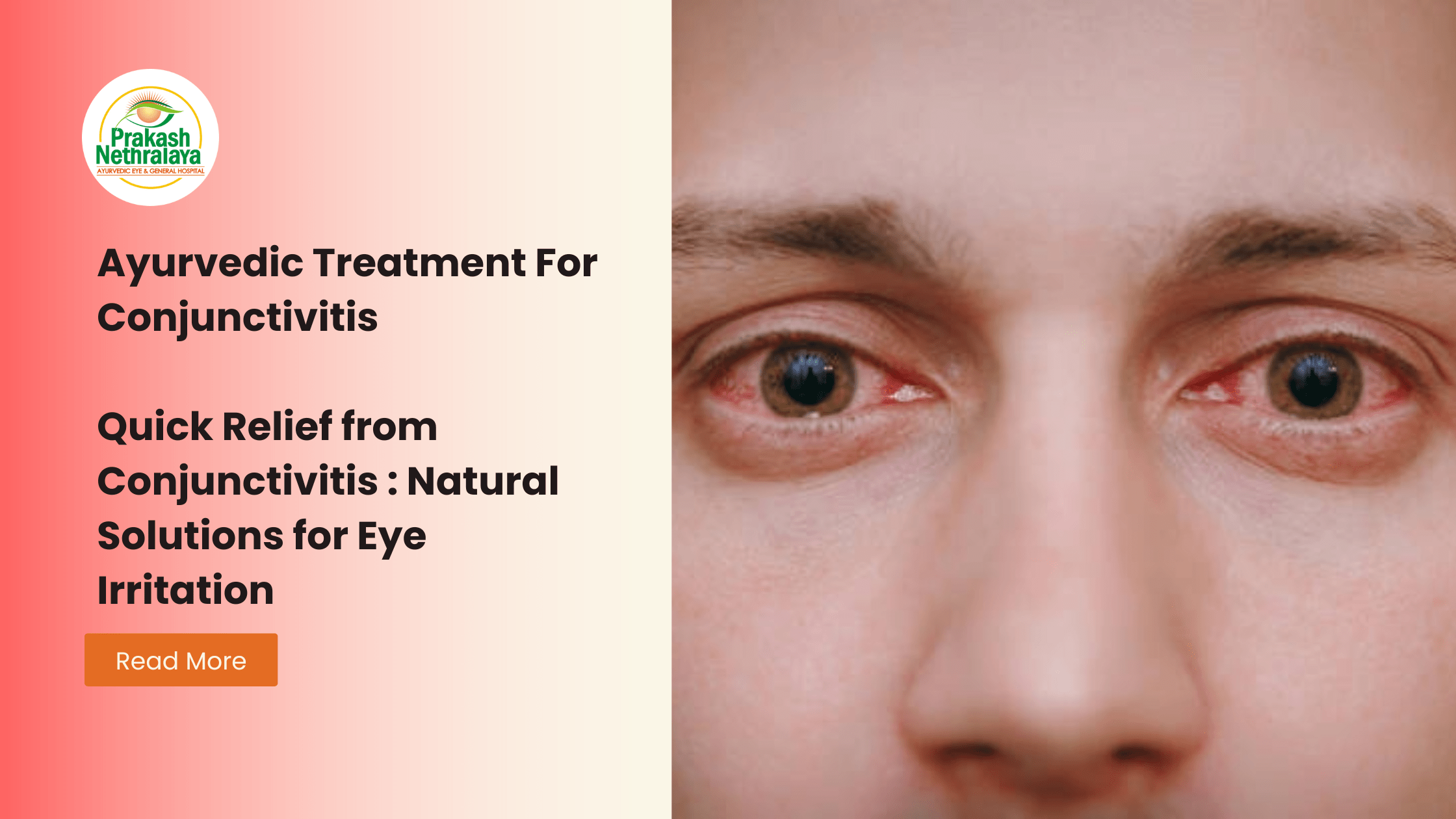Have you ever woken up with an itchy, uneasy feeling in your eye? If you’ve ever experienced this, you might have faced conjunctivitis, often known as pink eye. It’s not just a simply annoyance; it can genuinely disrupt your daily activities. But before you rush to the pharmacy, have you considered Ayurvedic treatment for conjunctivitis? This traditional approach might offer you the gentle and effective relief you’re searching for.
In Conjunctivitis disease, Ayurveda highlights natural remedies that soothe symptoms safely and effectively. In this blog, we dive into Ayurveda’s rich list of treatments—from herbal mixes to soothing compresses. We’ll explore how these natural remedies provide quick relief from irritation and help prevent future occurrences. Join us as we reveal the secrets of Ayurveda, bringing you comfort and clarity in managing eye health.
Understanding Conjunctivitis
The conjunctiva, a thin, transparent membrane covering the white part of the eye and the inner eyelid, can become inflamed and result in pink eye. This common eye condition can stem from various causes, categorized into three main types: bacterial, viral, and allergic. Bacterial conjunctivitis is caused by bacteria and often leads to thick, yellow-green discharge. Viral conjunctivitis, usually linked to colds, produces watery discharge. Itchy, watery eyes are the consequence of allergic conjunctivitis, which is brought on by allergens like pollen.
Effective treatment of conjunctivitis depends on the patient’s ability to identify its symptoms. Common signs include redness in one or both eyes, itchiness, and a gritty feeling as if something is in your eye. Discharge that forms a crust overnight may also occur, making it difficult to open your eyes in the morning. For those seeking natural relief, Natural treatment for conjunctivitis offers a holistic approach. Treatment in Ayurveda focuses on alleviating symptoms through herbal remedies and lifestyle adjustments, providing a comforting alternative to conventional medications.
Conventional Treatments vs. Natural Remedies
Conventional Treatments for Conjunctivitis:
- Bacterial conjunctivitis: To treat bacterial conjunctivitis, eye medications or ointments that combat the infection are typically used.
- Viral conjunctivitis: This condition usually clears up on its own. To relieve pain, lubricating eye drops and cold compresses are advised.
- Allergic Conjunctivitis: Eye drops containing antihistamines or anti-inflammatory agents are used to treat allergic conjunctivitis and lessen swelling and irritation.
Transition to Natural Remedies:
- Despite the effectiveness of these conventional methods, an increasing number of individuals are exploring natural remedies as a supportive or alternative approach. Ayurvedic treatment for conjunctivitis offers a holistic perspective.
- Herbal Eye Washes: Utilising natural ingredients to soothe irritation.
- Dietary Adjustments: incorporating anti-inflammatory foods to support eye health.
- Lifestyle Changes: Modifying daily habits to reduce exposure to irritants.
In Ayurveda for conjunctivitis treatment, we focus on alleviating symptoms through gentle, natural means while addressing the underlying causes of the eye irritation. This approach provides a sustainable option that minimizes reliance on pharmaceuticals and reduces potential side effects.
Natural Remedies for Conjunctivitis:
- Cool Compresses: Apply a clean, cool cloth to closed eyes to reduce swelling and alleviate irritation.
- Chamomile Tea Bags: Soak in warm water, then place with closed eyes to help soothe symptoms due to its calming properties.
- Honey: Known for its antibacterial qualities. Dilute in warm water and use as an eye wash to safely apply without irritation.
- Aloe Vera: Apply gel around the eye area for its soothing and anti-inflammatory effects, ensuring it does not enter the eyes.
- Boric Acid: A mild antibacterial agent historically used for eye cleansing. Dissolve in water for a safe eye rinse.
- Breast Milk: Though controversial, some traditional practices recommend a few drops for its natural antibodies, though scientific backing is limited.
These methods can support Ayurvedic and natural treatment for conjunctivitis and complement it by targeting symptoms with gentle, holistic approaches.
Preventive Measures and Tips for Conjunctivitis
Hygiene Tips:
- Wash hands regularly: It is possible to stop conjunctivitis from spreading by regularly washing your hands with soap and water.
- Avoid Contact: To lower the chance of illness transmission, minimize hand-to-eye contact.
- Use Clean Towels and Washcloths: Always use a clean towel or washcloth for your face and eyes to avoid contamination.
- Change pillowcases frequently: Replace pillowcases regularly to limit exposure to irritants and pathogens.
Dietary Suggestions:
- Increase Vitamin A and C Intake: Consume foods high in vitamins A and C, such as carrots, sweet potatoes, spinach, and citrus fruits, to support eye health.
- Omega-3 Fatty Acids: Include foods rich in omega-3s like fish, flaxseeds, and walnuts to help reduce inflammation.
- Stay Hydrated: Drinking adequate water is essential for maintaining healthy tear film and overall eye moisture.
Incorporating these hygiene practices and dietary adjustments can significantly aid in the prevention and management of conjunctivitis. Adopting these habits supports conjunctivitis treatment as per Ayurveda by supporting a healthier environment for your eyes and strengthening your immune system against infections.
When to see a doctor for conjunctivitis
While natural and ayurvedic remedies in conjunctivitis treatment can provide relief for mild cases, it’s crucial to seek professional medical advice if symptoms persist or worsen. Conjunctivitis, though often not severe, can sometimes lead to more significant health issues if not properly treated. If your symptoms do not improve after a few days of home treatment, consulting a healthcare provider is essential.
There are specific signs that necessitate immediate medical attention. If you experience severe eye pain, vision problems, intense redness, or sensitivity to light, these may indicate a more serious condition requiring prompt treatment. Additionally, if conjunctivitis is accompanied by signs of an infection, such as fever or excessive discharge, it’s important to visit a doctor. These symptoms could suggest a bacterial infection or another underlying health issue that might require antibiotic treatment or other medical interventions.
Lifestyle and Environmental Factors Influencing Conjunctivitis:
Lifestyle Changes for Prevention:
- Avoid allergens: Use air purifiers and stay away from dusty or pollen-heavy areas to mitigate allergic reactions.
- Adjust home environment: fans or dehumidifiers to maintain a clean airspace free of irritants.
- Regular Eye Care Routine: Incorporate daily eye hygiene practices, such as washing hands before touching the eyes and using clean face towels, to prevent infection.
- Limit Screen Time: Reduce eye strain by limiting exposure to screens, adjusting brightness settings, and taking frequent breaks to rest the eyes.
Impact of Environmental Factors:
- Smoke and Chemicals: Exposure to smoke or chemical fumes can significantly aggravate conjunctivitis. Protect eyes with goggles in high-risk environments and ensure proper ventilation in workspaces.
- Reduce indoor pollutants: Minimize the use of aerosols and harsh cleaning products that can contribute to eye irritation.
- Climate Control: Maintain moderate humidity and temperature in living spaces to prevent dryness and irritation of the eyes.
- Protective Eyewear: Wear sunglasses outdoors to shield eyes from UV rays and airborne allergens, further reducing the risk of irritation.
In Ayurveda, the natural treatment of Conjunctivitis disease advocates for these preventive measures, emphasizing the need to modify environmental and lifestyle factors. This holistic approach not only helps manage symptoms but also reduces the likelihood of recurrence. Ayurvedic treatment of conjunctivitis also suggests integrating these strategies into daily routines for overall better eye health.
Conclusion
Managing conjunctivitis effectively involves more than just treatment; it requires a proactive approach to lifestyle and environmental management. Conjunctivitis Ayurvedic treatment provides a comprehensive way to not only address the symptoms but also to prevent future episodes. At Prakash Nethralaya in Rajasthan, India, we specialize in ayurvedic treatment of Conjunctivitis problems offering personalized care that aligns with nature’s wisdom.
If you’re seeking relief from conjunctivitis and prefer a natural, holistic approach, we are here to help. Discover the benefits of Ayurvedic eye care and take a step towards healthier vision. Visit us at Prakash Nethralaya to learn more about how our treatments can provide you with effective, natural relief.
For online booking – you can consult online at Prakash Nethrayala.

